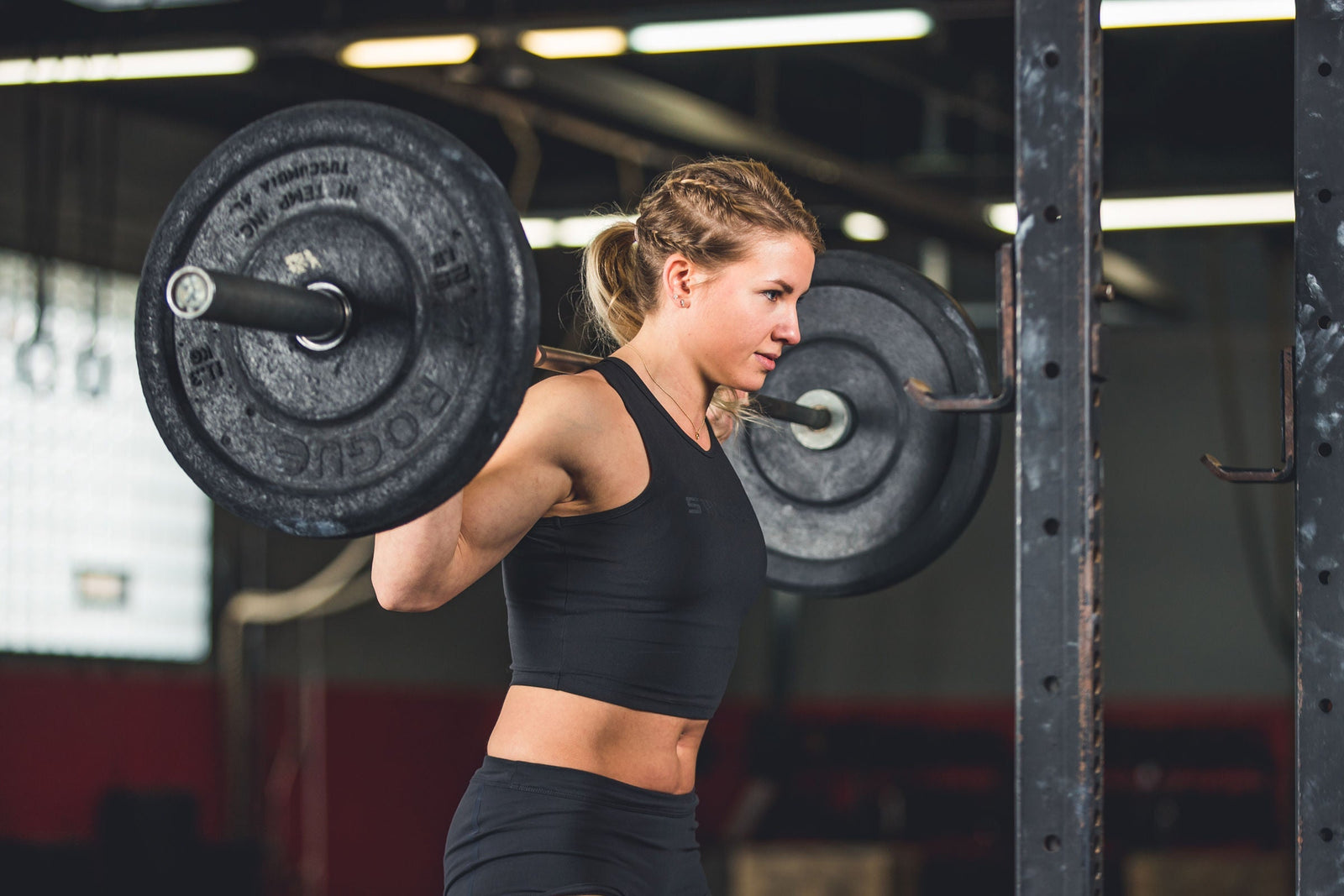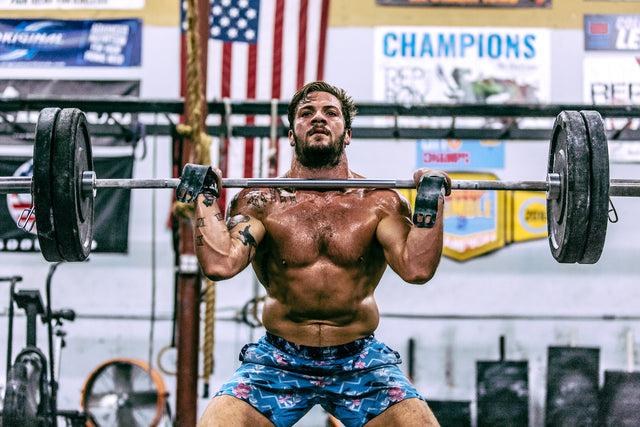Designing an effective functional strength training program, requires several key components to ensure you get the results you want. Compound movements engage multiple muscles groups and joints at the same time and provide a myriad of additional benefits as compared to isolation exercises, which put a specific emphasis on only one muscle group.
What Are Compound Movements?
Compound movements are the foundation of functional strength training — multi-jointed exercises that require multiple muscle groups to work together in a coordinated effort. Movements like squats, deadlifts, and push presses mimic real-life actions and promote full-body strength, mobility, and stability.
Unlike machine-based isolation exercises, compound movements demand more neuromuscular engagement, core control, and range of motion, helping you move better in both training and daily life.
“Compound exercises recruit multiple joints and muscles, resulting in higher strength gains and improved physical functionality.”
— Paoli et al., Journal of Strength and Conditioning Research
Why Compound Movements Require Free Weights
Compound movements are most effective when performed with free weights, which challenge your body to stabilize itself in space. While machines have their place in hypertrophy and rehab training, free-weight compound lifts train you to manage external load through your entire kinetic chain — not just an isolated joint.
Common examples:
-
Squats (quads, glutes, hamstrings, core, spinal erectors)
-
Deadlifts (posterior chain, grip, core, back)
-
Push Press (shoulders, triceps, legs, core)
5 Proven Benefits of Compound Movements
Compound movements provide a wide range of benefits thanks to the number of muscles, joints, and stabilizers involved. Below are five of the most impactful advantages:
1. Compound Movements Build More Muscle and Strength
Compound exercises involve multiple muscles working together. This leads to more muscle fiber recruitment, increased training load capacity, and a stronger anabolic stimulus to drive muscle protein synthesis.
With proper programming — such as periodization and progressive overload — compound lifts can dramatically increase both size and strength across all major muscle groups.
“Free-weight multi-joint exercises promote greater testosterone and growth hormone responses than single-joint movements.”
— Goto et al., European Journal of Applied Physiology
2. Compound Movements Improve Mobility
If you don’t use it, you lose it — and mobility is one of the first things to decline with age or sedentary behavior. Compound exercises train your joints to move through a full range of motion, preserving mobility and improving movement efficiency.
For instance:
-
Squats improve ankle, hip, and thoracic mobility
-
Deadlifts enhance hamstring and hip flexor function
-
Overhead presses improve shoulder flexion and scapular movement
Unlike isolation movements (e.g., leg extensions), which limit joint involvement, compound movements like squats and lunges activate the entire kinetic chain, leading to better posture, joint health, and functional balance.
RELATED ARTICLE: 6 Easy Movements To Improve Mobility
3. Compound Movements Correct Muscular Imbalances
We all develop small muscular imbalances from lifestyle habits — sitting at a desk, sleeping on one side, or carrying bags unevenly. Over time, these imbalances can lead to compensations, injury, and postural dysfunction.
Compound movements engage stabilizing muscles and demand symmetry across limbs, helping to expose and correct discrepancies in strength or mobility. Exercises like lunges, Romanian deadlifts, and rows challenge each side independently and improve coordination, proprioception, and core stability.
“Compound free-weight exercises activate core musculature more effectively than machines.”
— Saeterbakken et al., Journal of Strength and Conditioning Research
Note: Isolation movements can still play a valuable role in correcting imbalances when used to specifically strengthen lagging or weaker muscles — but they should supplement, not replace, compound training.
4. Compound Movements Burn More Calories
Compound lifts require significantly more energy expenditure due to the number of muscles working together — meaning you burn more calories in less time.
Compared to isolation exercises like bicep curls or leg extensions, compound lifts stimulate:
-
Greater metabolic demand
-
Higher oxygen consumption (EPOC)
-
Increased cardiovascular strain
-
Greater hormonal response (GH, cortisol, testosterone)
This makes them essential for body recomposition, fat loss, and long-term metabolic efficiency.
“Multi-joint resistance exercises have significantly higher energy cost than single-joint movements.”
— Scott, Journal of Strength and Conditioning Research
5. Compound Movements Reduce the Risk of Injury
Intentional, properly executed compound training develops functional movement patterns that translate to real-world strength.
If you know how to hinge at the hips during a deadlift, you’re less likely to throw out your back picking up a heavy box. If you practice squatting with control and depth, you’ll be more stable climbing stairs or standing from a chair. Functional training teaches your body how to move, not just how to lift.
In addition, stronger stabilizers, ligaments, and postural muscles — all recruited in compound lifts — help prevent joint breakdown and muscular compensations that cause chronic injuries.
“Strength training that includes compound lifts has been shown to improve motor control and lower injury risk.”
— Lauersen et al., British Journal of Sports Medicine
Final Thoughts: Why Compound Movements Should Be the Foundation of Your Training
If your training goal is to move better, lift more, build real-world strength, or just feel more confident in your body — compound movements should be the core of your program.
They develop:
-
Functional strength
-
Core stability
-
Mobility
-
Athletic coordination
-
Total-body muscle mass
-
Injury resilience
Machines and isolated movements have their place — but to build the foundation, you need compound lifts.
Ready to get stronger with intent? Check out expert coaching at The Swole Kitchen and level up your training with performance supplements at Swolverine.
The Best Compound Movements For Functional Strength And Mass
1. Barbell Back Squat
The barbell back squat is a bilateral structural movement that helps build full-body strength. Barbell back squats, and back squats in general, demand a strong posterior chain, hamstrings, quads, and a relative amount of midline stability as well as ankle mobility. Oh and let's not forget impeccable form in order to reap the biggest benefits.
RELATED ARTICLE How To Build A Stronger Back Squat
2. Barbell Deadlift
Barbell Deadlifts have many known full body benefits and are extremely crucial in the development of total-body strength, proper hip function, core strength, and spine stabilization (which can reduce the risk of lower back injuries). Since deadlifts recruit multiple muscle groups, joints, and stabilizing muscles, they also burn more calories and more body fat as compared to other exercise movements. With the proper form, the deadlift can add a ton of performance and health benefits, to your training program
RELATED ARTICLE 5 Deadlift Benefits That Will Improve Your Training
3. Dumbbell Push Press
The push press is a prerequisite to the Military Press aka the Strict Press. The push press uses the full body to move weight from the shoulder to overhead movement in a quick, effective motion. The push press is an effective compound movement that recruits the legs, core, and upper body which ends up driving the weight into the overhead position. While the push press movement does require the legs to bend, the completion of the movement has straight legs, straight arms, and the weight will be overhead in a full lockout position.
RELATED ARTICLE 4 Proven Benefits Of Push Press
4. Dumbbell Romanian Deadlift
The Romanian deadlift or commonly known as the RDL, is a functional compound strength movement and variation to the traditional deadlift. Most often used as an accessory lift, with a submaximal load, the Romanian deadlift has many applications in strength training, as well as high-intensity functional training programs.
The Romanian deadlift is slightly different than the traditional deadlift. Although both movements will increase strength and muscle hypertrophy in the posterior chain muscles, Romanian deadlifts emphasize and target the hamstrings, as opposed to the glutes [R]. Electromyography (EMG) studies show that conventional deadlifts target and recruit the gluteus and rectus femoris muscles more so than the RDL, due to the biomechanical differences in exercise technique as the conventional deadlift starts and finishes more in a sitting position than the RDL with significantly more knee and hip flexion.
The primary muscles involved in the RDL are the posterior chain muscles, including the erector spinae, trapezius, gluteus maximus, hamstrings, and adductors.
RELATED ARTICLE 4 Proven Benefits Of Romanian Deadlifts
5. Dumbbell Bench Press
Arguably one of the most popular and effective chest exercises, the bench press is a staple in the gym to build more push strength and increase muscle mass. Studies have shown that the bench press is an extremely effective strength-training exercise, eliciting a high-level of muscle activity in the pectoralis major. If your goal is to build a well-rounded physique, and more functional strength, then bench press needs to be in your training program.
Bench press is a compound movement that involves the pectoralis major, deltoids, triceps, and the upper arms. The bench press can develop and build more strength and size, and also improve balance in movements amongst athletes.
RELATED ARTICLE 4 Benefits Of Bench Press You Need In Your Training Program
6. Good Mornings
Often misunderstood, the good morning exercise is a neglected yet effective compound movement functioning as a mix between the squat and the deadlift. Also called a hip-hinge the good morning has earned a somewhat infamous reputation for being a bit on the dangerous side. When done correctly however, good mornings are an effective strength exercise that benefit the muscles in your posterior chain including the hamstrings, glutes, and lower back.
Training with intent or purpose, is always important to reach your goals. If you’re training to build more leg strength, improve hip mobility, or strengthen your posterior chain, the good morning can be extremely beneficial. Often referred to as training specificity, or how an exercise replicates functional activities to produce the greatest performance gains, good mornings are effective at increasing functional strength in the hamstrings and lower back, due to its specific training purpose.
RELATED ARTICLE 5 Benefits Of The Good Morning Exercise
7. Dumbbell Overhead Press
If you want bigger and defined shoulders, then you need to include the overhead press in your training routine. Although you'll build more muscle and strength, the overhead press offers more functional benefits, than just isolated strength. Overhead press is a functional compound movement and engages multiple muscle groups, stabilizing muscles, and joints, which can improve mobility, core stability, and balance.
RELATED ARTICLE How To Overhead Press For Maximal Strength
Compound Movements: Takeaway
Compound movements are vital to a highly effective strength training program. These exercises will provide functional strength, mobility, core strength, and improve your posture, elevating critical human movement patterns, while building more size and more strength. No matter what your goals are, compound movements have a role in your training.
Need Help With Your Training And Finding A Program With Compound Movements?
SWOLVERINE IS AN ENDURANCE ATHLETE AND ACTIVE LIFESTYLE BRAND. MADE FOR THE ELITE ATHLETE, AND THE STRONG-WILLED OUR PRODUCTS WERE DESIGNED TO FUEL YOUR ATHLETIC PERFORMANCE. WE PERFORM WHEN YOU PERFORM.
We believe that everyone can optimize not only their athletic performance but their human potential. The way we believe we can optimize performance is through transparency, clinically effective doses, and clinically proven ingredients with evidence-based outcomes. We provide the nutrients you need to power your active lifestyle.













